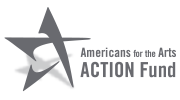Tuesday, July 21, 2015
Washington, D.C. — Americans for the Arts, the nation’s leading nonprofit organization for advancing the arts and arts education, and The Cultural Data Project (CDP), the most significant national resource for in-depth data about nonprofit arts, culture, and humanities organizations, today announced a new collaboration between the two organizations as Americans for the Arts begins its fifth national economic impact study of the nation’s nonprofit arts and culture industry, Arts & Economic Prosperity 5. CDP will provide the organizational data collection platform for the upcoming study, bringing together two of the nation’s most respected cultural data and research organizations to capture and communicate the economic value of the nonprofit arts and cultural industry. This cooperative effort will enrich national research and policy efforts, while at the same time streamlining data reporting for arts and cultural organizations.
Produced every five years, Arts & Economic Prosperity® is the largest, most comprehensive study conducted in the United States to measure the economic impact of nonprofit arts and culture organizations and their audiences. It quantifies the vital role of arts and cultural activity in strengthening local communities and the national economy, and provides specific and reliable data on the industry’s impact on jobs and government revenue. The most recent study, published in 2012 and based on fiscal year 2010 data, demonstrated that spending by nonprofit arts and cultural organizations and their audiences generated $135 billion in economic activity annually, supporting 4.1 million jobs and generating $22.3 billion in federal, state, and local government revenue.
“The broad base of arts and cultural organizations that will contribute their data to the Arts & Economic Prosperity 5 study will help us send a strong message to civic leaders that arts funding and economic prosperity are not mutually exclusive,” said Robert L. Lynch, president and CEO of Americans for the Arts. “Arts advocates rely on our study to strengthen their case for arts support with elected officials as well as community, civic, and business leaders. This new partnership with the Cultural Data Project will ease the reporting burden for our participating nonprofit arts organizations, and give those organizations access to valuable analytic tools and educational resources.”
CDP President and CEO Beth Tuttle commented, “This collaboration between the Cultural Data Project and Americans for the Arts will greatly expand the range of organizations represented in the national CDP dataset, providing deeper insight into the cultural sector’s breadth, contributions, assets, and activities. Thousands of organizations will gain free access to a top-tier suite of educational, analytic, and other business intelligence resources that support more effective planning, fundraising, and management.”
To produce the AEP5 study, Americans for the Arts will collaborate with more than 200 local and statewide partners—including local arts agencies, state arts agencies, community foundations, economic development agencies, and chambers of commerce— to survey more than 30,000 nonprofit arts and culture organizations located in all 50 states and the District of Columbia. The surveys will be implemented using the CDP’s powerful new online data collection and management platform, simplifying the data reporting process for the participating arts organizations.
By completing the Americans for the Arts survey, arts and cultural organizations will gain access to analytical reports, information insights, and educational resources that help them interpret and use data more effectively to advance their cultural missions. Small, under-resourced organizations that often lack access to such tools and management supports will particularly benefit.
Data collection for AEP5 will run through calendar year 2016. Americans for the Arts will produce a national economic impact report, a set of national advocacy tools, and statewide and local analyses in June 2017. More information is available at www.americansforthearts.org/research.





